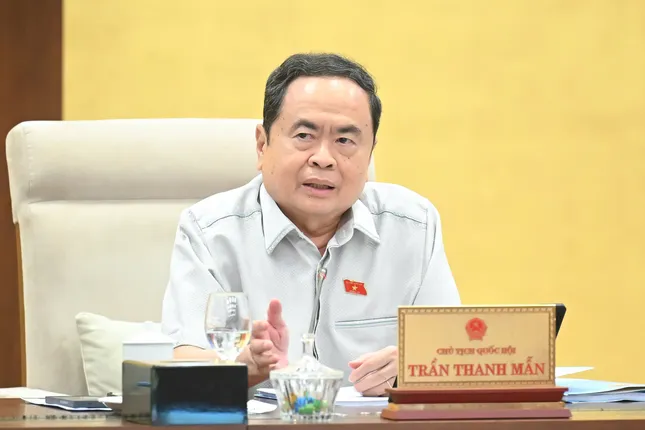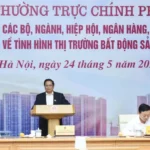Provincial Merger Resolution Expected to be Issued on June 13
On June 10, the National Assembly’s Standing Committee discussed the revision, explanation, and amendment of the draft Law on Amending and Supplementing a Number of Articles of the Law on Planning.
According to the explanatory report presented by Phan Van Mai, Chairman of the Committee for Economic and Financial Affairs, it is necessary to supplement and clarify the principles for handling contradictions between different types of planning. This provides a legal basis for the Government to issue detailed regulations on handling specific cases in practice.

Chairman of the Committee for Economic and Financial Affairs, Phan Van Mai. Photo: QH
However, the reviewing agency proposed studying appropriate solutions for contradictions between technical and specialized plans with the same planning organization. In this case, the planning organization will decide which plan needs adjustment.
For technical and specialized plans with a scope involving two or more provinces that contradict the provincial plan, the organization in charge of making the concrete plan must adjust the decision on the plan.
Speaking at the session, National Assembly Chairwoman Tran Thanh Man asked about the difficulties faced by localities in implementing the previous Law on Planning. She emphasized the need to identify whether the obstacles arise from the law itself or from decrees and circulars issued by local authorities. With the upcoming provincial and city mergers, she expressed her hope that the revised law would be effectively implemented.

National Assembly Chairwoman Tran Thanh Man speaking at the session. Photo: QH
According to the National Assembly Chairwoman, during the second part of the 9th session, expected to take place on June 12, the National Assembly will discuss the proposal for merging administrative units at the provincial level. If the National Assembly agrees, the Resolution on Provincial and City Mergers will be issued on June 13.
Therefore, the revision of the Law on Planning is of utmost importance. Both central and local authorities have demanded amendments to this law. While the National Assembly has conducted oversight on the implementation of the law, localities continue to face challenges in executing it. It is crucial to identify the issues to ensure that the revised law is comprehensive and practical.
Comprehensive Revision Post-Merger
Providing explanations during the session, Minister of Finance Nguyen Van Thang stated that the Law on Planning, as approved by the National Assembly, has undergone fundamental and comprehensive changes compared to previous laws. It consolidates various types of planning, including national, provincial, and lower-level planning.
However, during the implementation process, challenges arose as all 63 provinces and cities simultaneously embarked on planning, and the quality of consulting services varied, falling short of expectations in certain cases.

Minister of Finance Nguyen Van Thang. Photo: QH
Minister Thang acknowledged that the Law on Planning has never undergone a fundamental revision. This year’s amendments are driven by the need to accommodate changes in administrative boundaries and the merger of provinces and cities, as well as the transition from a three-tier to a two-tier local government system.
“This revision is not comprehensive and primarily focuses on addressing the immediate concerns. A more extensive revision will be necessary following the completion of the mergers. The Government will conduct a thorough review to make the necessary adjustments,” the Minister assured.
He also mentioned that the latest draft law has received a high level of consensus from local authorities, especially regarding the issues of decentralization and devolution. The Ministry of Finance has already drafted a decree and is seeking feedback from ministries, sectors, and localities to ensure its timely issuance, effective from July 1.
“Following the mergers, the development strategies of the localities will also change, particularly in terms of spatial planning. The Government will continue to work on this and submit proposals to the National Assembly for a fundamental revision of this law,” affirmed the Minister of Finance.
Establishing Vietnam’s First International Financial Center: A Proposal for the National Assembly
The International Financial Center will serve as a pivotal hub, connecting Vietnam to the global financial market and attracting foreign financial institutions. It will facilitate Vietnam’s integration into the international investment landscape, capitalizing on the shift in global investment flows.
Governor Nguyen Thi Hong: Zero-Interest Special Loans Only Applicable to Two Cases
“The State Bank’s special lending activities are essential and serve as a safeguard against the potential risk of a bank run, as well as limiting the contagion to other credit institutions,” Governor Nguyen Thi Hong emphasized.
Could an International Airport in Vietnam be Shutting Down for 6 Months?
“This state-of-the-art airport will serve as a gateway to boosting tourism and high-tech agricultural exports in Vietnam’s largest province. With its strategic location and modern infrastructure, the airport will unlock unprecedented opportunities for the region, fostering economic growth and connecting local businesses to the world.”
“Credit Options for Young Homebuyers: Exploring Loan Packages Tailored for the Youth”
The Government Office has released Announcement No. 294, conveying the Standing Government’s conclusions from their meeting regarding the real estate market situation.





















